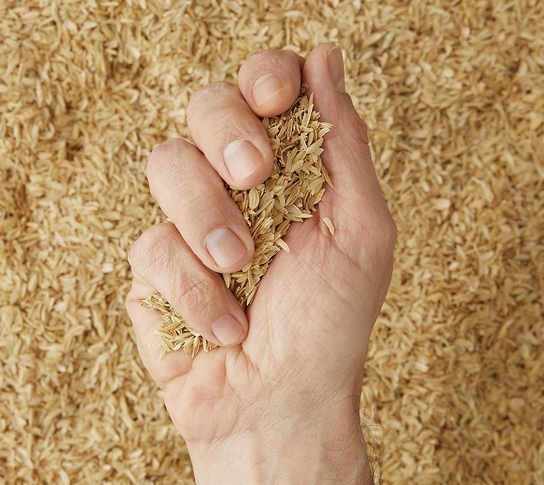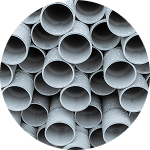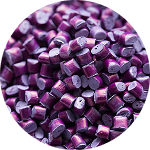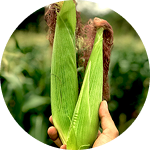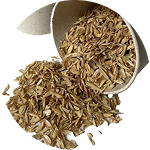CONVENTIONAL POLYMERS
RECYCLED POLYMERS
COMPOSTABLE POLYMERS
BIOBASED POLYMERS
ORYVAL
CONVENTIONAL POLYMERS
MIBEPA is a company specialized in the commercialization of polymers, offering innovative, high-performance solutions for a wide range of industries. With a diversified portfolio, we provide conventional, recycled, compostable, and bio-balanced polymers, ensuring raw materials that meet the most demanding applications. We work in partnership with leading manufacturers to deliver superior-quality materials suitable for processes such as injection, extrusion, blow molding, and thermoforming. Our technical expertise and close connection to the market allow us to offer solutions tailored to customer needs, optimizing production processes and adding value to final products. With a continuous commitment to innovation, MIBEPA keeps pace with industry developments, supplying polymers that combine performance, versatility, and efficiency.
POLÍMEROS RECICLADOS
MIBEPA applies strict criteria in selecting its recycled polymer suppliers, prioritizing manufacturers that implement sustainable and innovative processes. Our partners follow high technical standards, using advanced recycling technologies to ensure materials of superior quality and performance. In addition, supplier selection takes into account traceability and environmental certifications, ensuring that the products offered minimize ecological impacts and promote the circular economy. By investing in high-performance recycled solutions, MIBEPA reaffirms its commitment to sustainability, delivering products that meet the market’s technical requirements while fostering responsible practices in the plastics industry.
COMPOSTABLE POLYMERS
MIBEPA markets products formulated from plant-based biopolymers, designed to decompose in soil within a short period of time, significantly reducing the carbon footprint. This approach responds to the growing demand for sustainable solutions, meeting both regulatory requirements and the environmental awareness of consumers and the industry. The compostable raw materials supplied by MIBEPA are widely used in the production of plastic bags, disposable cups, sustainable packaging, agricultural plastics, and coffee capsules. These products comply with the strictest regulations on single-use plastics and represent viable eco-friendly alternatives for companies seeking to reduce their environmental impact and adhere to the principles of the circular economy.
BIOBASED POLYMERS
The biobased polymers marketed by MIBEPA are innovative products developed from renewable sources such as sugarcane, corn, and other plant-based resources. These polymers provide a sustainable alternative to traditional plastics, reducing dependence on fossil fuels and contributing to lower carbon emissions. Despite their renewable origin, biobased polymers maintain physical and mechanical properties equivalent to conventional polymers, making them suitable for a wide range of industrial applications.
ORYVAL
ORYVAL is the result of a partnership between Mibepa, CQ Massó and Oryzite. Designed to reduce the use of plastic and the carbon footprint in the packaging industry, ORYVAL is recyclable and compatible with common manufacturing processes such as injection and extrusion, promoting more sustainable production.
RAW MATERIALS
RAW MATERIALS
RAW MATERIALS
RAW MATERIALS
RAW MATERIALS
RAW MATERIALS
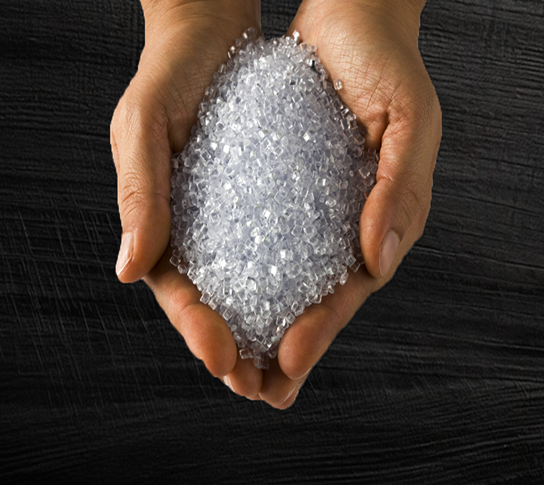
Polyethylene - PE
Polyethylene (PE) is one of the most versatile and widely used plastics due to its strength, flexibility, and durability. Found in a broad range of products and applications, from household items to the industrial sector, it stands out for its adaptability to different manufacturing processes. Available in various forms—from thin films to rigid structures—polyethylene is compatible with techniques such as injection molding, extrusion, and thermoforming, ensuring efficiency and performance for the diverse needs of the market.
Polyethylene - PE
Polyethylene (PE) is one of the most versatile and widely used plastics due to its strength, flexibility, and durability. Found in a broad range of products and applications, from household items to the industrial sector, it stands out for its adaptability to different manufacturing processes. Available in various forms—from thin films to rigid structures—polyethylene is compatible with techniques such as injection molding, extrusion, and thermoforming, ensuring efficiency and performance for the diverse needs of the market.

APPLICATIONS
HIGH DENSITY
MEDIUM DENSITY
LOW DENSITY
AVERAGE LINEAR DENSITY
LOW LINEAR DENSITY
Polypropylene - PP
Polypropylene (PP) is a highly versatile and durable thermoplastic, widely used due to its excellent mechanical properties, light weight, and high thermal resistance. It stands out for its durability, rigidity, and chemical resistance, making it the ideal choice for a wide range of applications, from packaging and consumer goods to industrial and automotive components. Thanks to its unique combination of characteristics, polypropylene delivers high performance in injection molding, extrusion, and thermoforming processes, ensuring efficiency and quality across various industries.
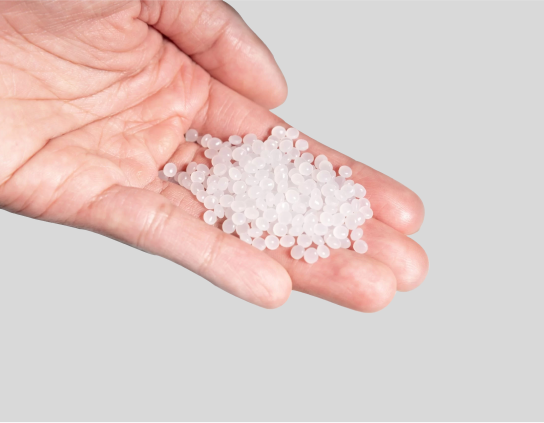
APPLICATIONS
HOMOPOLYMER
Heterophasic copolymer
Random copolymer
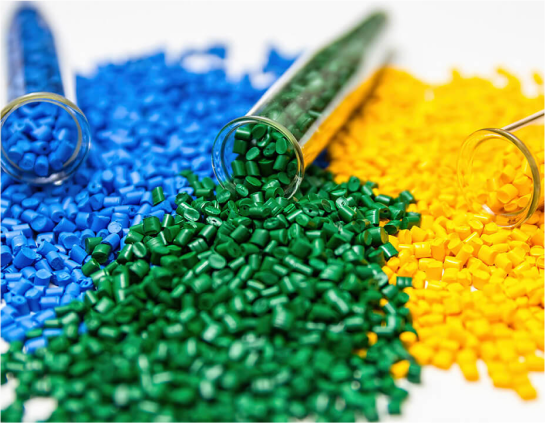
STYRENES - PS, ABS, SAN
Styrenics – PS, ABS, and SAN – are thermoplastics widely recognized for their versatility and strength, serving a broad range of industrial and commercial applications.
Polystyrene (PS) is a rigid and cost-effective material, widely used in the production of packaging, disposable products, and general-purpose items.
Acrylonitrile Butadiene Styrene (ABS) stands out for its high impact resistance and thermal stability, making it ideal for automotive components, electronics, and structural parts.
Styrene Acrylonitrile (SAN) combines rigidity with excellent chemical and thermal resistance, making it the ideal choice for products requiring durability and transparency, such as medical equipment and household items. Thanks to their distinct properties, these polymers provide efficient and reliable solutions for a wide range of industrial sectors.
STYRENES - PS, ABS, SAN
Styrenics – PS, ABS, and SAN – are thermoplastics widely recognized for their versatility and strength, serving a broad range of industrial and commercial applications.
Polystyrene (PS) is a rigid and cost-effective material, widely used in the production of packaging, disposable products, and general-purpose items.
Acrylonitrile Butadiene Styrene (ABS) stands out for its high impact resistance and thermal stability, making it ideal for automotive components, electronics, and structural parts.

Styrene Acrylonitrile (SAN) combines rigidity with excellent chemical and thermal resistance, making it the ideal choice for products requiring durability and transparency, such as medical equipment and household items. Thanks to their distinct properties, these polymers provide efficient and reliable solutions for a wide range of industrial sectors.
POLYVINYL CHLORIDE - PVC
Polyvinyl Chloride (PVC) is a highly versatile and durable plastic, widely recognized for its strength, flexibility, and longevity. Thanks to its excellent mechanical properties, fire resistance, and durability, PVC is used across various industries. Its ability to be molded into different shapes and thicknesses makes it ideal for a wide range of applications, from construction and electronics to everyday products such as pipes, cables, and coatings. Due to its robustness, it is a popular choice for environments requiring high-performance materials.
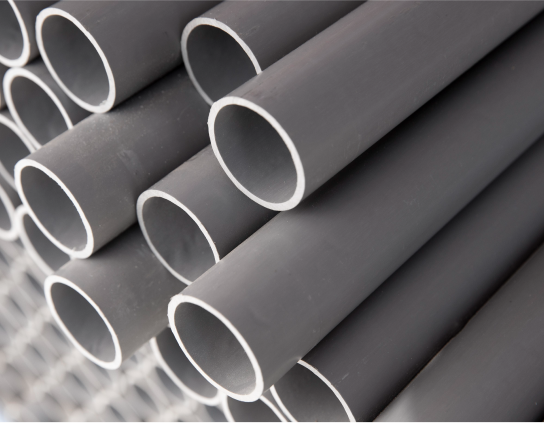
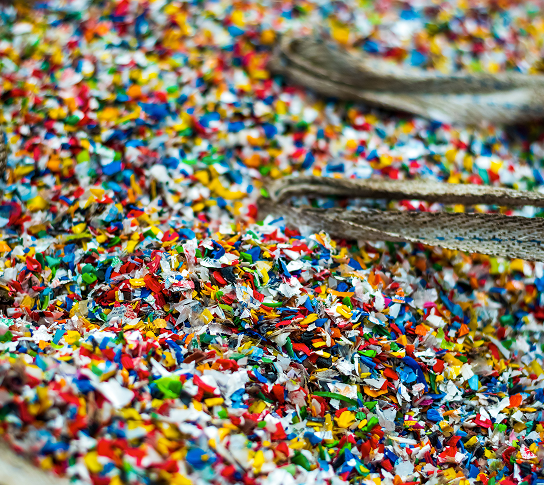
POST-CONSUMER POLYMERS
Post-Consumer Recycled Polymers (PCR) are obtained from plastic waste discarded by end consumers, such as packaging and PET bottles. This material undergoes a rigorous sorting process followed by mechanical or chemical recycling, resulting in high-quality polymers that can be reintroduced into the production chain. The use of PCR significantly reduces the need for virgin resins, contributing to carbon emission mitigation and the preservation of natural resources.
POST-CONSUMER POLYMERS
Post-Consumer Recycled Polymers (PCR) are obtained from plastic waste discarded by end consumers, such as packaging and PET bottles. This material undergoes a rigorous sorting process followed by mechanical or chemical recycling, resulting in high-quality polymers that can be reintroduced into the production chain. The use of PCR significantly reduces the need for virgin resins, contributing to carbon emission mitigation and the preservation of natural resources.

POST-INDUSTRIAL POLYMERS
Post-Industrial Recycled (PIR) materials are obtained from waste generated during industrial processes, such as trimmings and production scraps. PIR is reused to avoid waste and optimize the use of resources. This sustainable practice reduces the amount of discarded waste, improves production efficiency, and maintains material quality for various industrial applications.
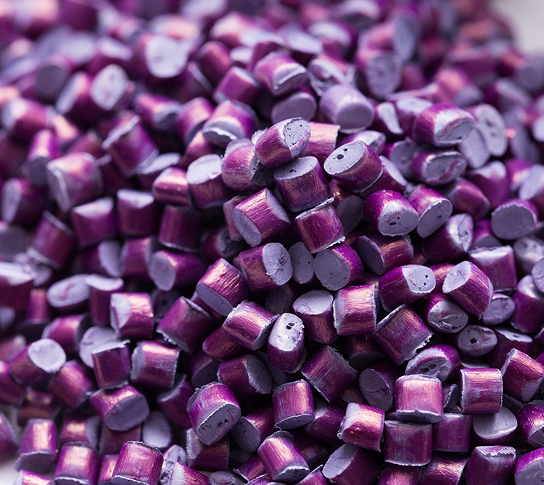
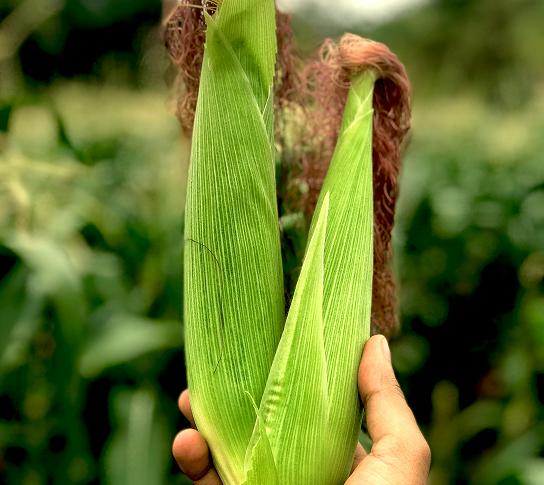
BIOPBS (POLYBUTYLENE SUCCINATE)
BIOPBS is a biodegradable polyester derived from renewable sources such as cassava and corn. It features thermal and mechanical resistance, making it ideal for flexible and rigid packaging, as well as agricultural films. Its efficient decomposition in composting environments reduces the generation of persistent plastic waste.
BIOPBS (POLYBUTYLENE SUCCINATE)
BIOPBS is a biodegradable polyester derived from renewable sources such as cassava and corn. It features thermal and mechanical resistance, making it ideal for flexible and rigid packaging, as well as agricultural films. Its efficient decomposition in composting environments reduces the generation of persistent plastic waste.

PLA (POLYLACTIC ACID)
PLA is a biodegradable polymer produced from renewable resources such as corn starch and sugarcane. It offers high transparency, rigidity, and good barrier properties, making it suitable for cups, cutlery, trays, and thermoformed packaging. Its industrial compostability ensures complete degradation under controlled conditions, providing sustainable alternatives to conventional plastics.
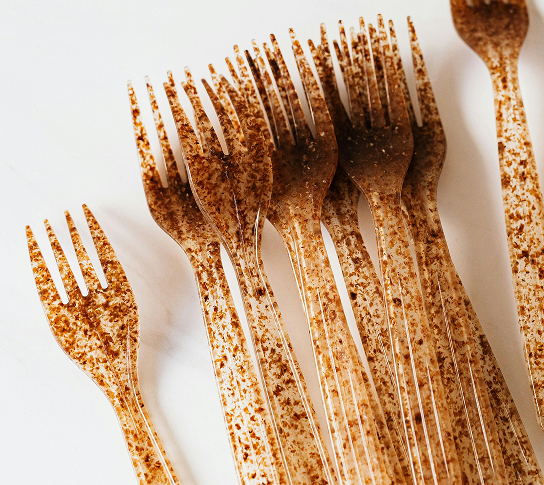
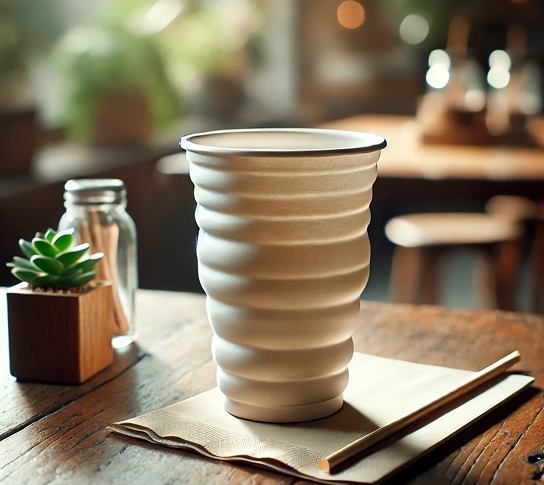
PBAT (POLYBUTYLENE ADIPATE TEREPHTHALATE)
PBAT is a biodegradable polyester that combines flexibility and mechanical strength, widely used in compostable bags, plastic films, and paper coatings. Its chemical structure enables accelerated decomposition, making it essential for applications where durability and biodegradability must coexist.
PBAT (POLYBUTYLENE ADIPATE TEREPHTHALATE)
PBAT is a biodegradable polyester that combines flexibility and mechanical strength, widely used in compostable bags, plastic films, and paper coatings. Its chemical structure enables accelerated decomposition, making it essential for applications where durability and biodegradability must coexist.

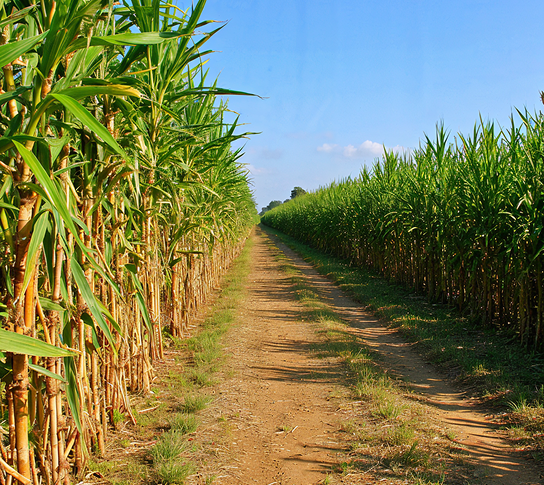
BIO-BASED POLYETHYLENE
MIBEPA offers bio-based polyethylene, an innovative thermoplastic derived from sugarcane, whose production captures and stores carbon dioxide (CO₂) from the atmosphere, contributing to the reduction of the carbon footprint of final products. This material presents the same characteristics as conventional polyethylene, such as chemical resistance, flexibility, and processability, while being fully compatible with existing recycling systems.
BIO-BASED POLYETHYLENE
MIBEPA offers bio-based polyethylene, an innovative thermoplastic derived from sugarcane, whose production captures and stores carbon dioxide (CO₂) from the atmosphere, contributing to the reduction of the carbon footprint of final products. This material presents the same characteristics as conventional polyethylene, such as chemical resistance, flexibility, and processability, while being fully compatible with existing recycling systems.

Investment in bio-based polymers represents a significant advancement for the plastics industry, enabling the adoption of more sustainable solutions without compromising product quality and functionality. The transition to renewable-based materials helps mitigate environmental impacts and fosters responsible practices throughout the value chain.
ORYVAL
ORYVAL is the result of a partnership between Mibepa, CQ Massó and Oryzite. Designed to reduce the use of plastic and the carbon footprint in the packaging industry, ORYVAL is recyclable and compatible with common manufacturing processes such as injection and extrusion, promoting more sustainable production.
